Dos and Don’ts of Paranormal Investigation
Paranormal investigations can be fascinating, but they must also be responsible, safe, and ethical. Below is a structured guide to help investigators conduct themselves with professionalism and caution.
⚠️ Safety First
-
👥 Never Investigate Alone
-
Always work in teams.
-
Solo only for very experienced investigators—with backup nearby.
-
-
🧰 Basic Safety Practices
-
Stay aware of hazards.
-
Bring safety gear: flashlight, radio, first aid kit.
-
Have EMT/security if possible.
-
-
🚫 Avoid Risky or Irresponsible Behavior
-
No stunts, no careless wandering.
-
❌ No smoking, alcohol, or drugs—keep your perception clear.
-
-
✝️ Handling Spiritual Practices
-
Avoid hasty exorcisms without experts.
-
Cleansing rituals (if desired) should be respectful of traditions.
-
Never force entities to leave without understanding consequences.
-
-
🙅 Maintain Discipline
-
No children, no disruptive individuals.
-
Keep behavior serious and respectful.
-
📝 Preparation
-
💪 Physical Readiness
-
Don’t investigate when sick or exhausted.
-
Wear proper clothing/gear.
-
Bring extra batteries and essentials.
-
-
🧘 Psychological Readiness
-
Avoid investigating when stressed or personally attached to the case.
-
Meditate or center yourself beforehand.
-
-
🕯️ Spiritual Readiness (Optional)
-
Use prayers or protective rituals if it helps you.
-
Respect teammates’ different practices.
-
-
🤝 Buddy System
-
Always have at least one partner.
-
📚 Knowledge and Skills
-
Build a Foundation
-
Learn about apparitions, hauntings, poltergeists, etc.
-
Study parapsychology, psychology, and cultural beliefs.
-
-
Continuous Education
-
Stay updated on research and technology.
-
Avoid relying solely on folklore or gadgets.
-
-
🔧 Technology Mastery
-
Learn how devices work—and their limits.
-
Remember: tools don’t “detect ghosts,” they detect environmental changes.
-
-
Research and Baselines
-
Study the location’s history.
-
Record environmental baseline readings first.
-
-
🗒️ Documentation
-
Keep detailed logs: time, place, conditions, equipment, experiences.
-
Cross-check data later.
-
🔍 Investigative Techniques
-
Personal Observations
-
Log subjective impressions separately from objective observations.
-
Note when multiple people perceive the same event.
-
-
Environmental Checks
-
🔦 Inspect light sources.
-
🚪 Check hinges and doors/windows.
-
🎵 Test acoustics—sounds travel strangely in old spaces.
-
🌍 Monitor vibrations near roads or construction.
-
-
Time and Data Management
-
⏰ Synchronize clocks.
-
Take initial readings both with devices on and off.
-
Review all evidence thoroughly—even if tedious.
-
🧭 Investigative Integrity
-
Evidence Control
-
🧤 Use gloves if necessary.
-
Turn off phones (airplane mode).
-
Avoid perfumes, food, noises, or chatter.
-
-
Professional Practice
-
Don’t leave the site unattended.
-
Cross-verify data with multiple devices.
-
Combine tech readings with human experiences.
-
-
Balanced Skepticism
-
Look for natural causes first.
-
Explore odd but non-paranormal explanations.
-
Respect witness accounts, but test them.
-
-
Peer Validation
-
Hold team debriefs.
-
Share findings for peer review.
-
Consult experts (historians, psychologists, scientists, specialists).
-
🤝 Ethical Considerations
-
Professional Conduct
-
Maintain honesty, fairness, and respect.
-
Protect property and client needs over “evidence.”
-
Offer referrals if clients need further help.
-
-
Informed Consent
-
✍️ Get written permission for property access, photos, recordings.
-
Respect “off-limits” areas.
-
-
Privacy and Confidentiality
-
Protect witness identity if requested.
-
Leave the site exactly as found—no souvenirs.
-
-
Team and Witness Management
-
Screen team members for suitability.
-
Handle vulnerable individuals with extra care.
-
Don’t frighten or sensationalize to impress clients.
-
-
Media and Public Communication
-
📢 Share only verified information.
-
Involve media only with everyone’s consent.
-
Avoid sensationalism for entertainment.



Comments
Post a Comment